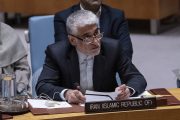
On October 19, news outlet Bloomberg reported that the United States is exercising control over Israel’s plans for a ground operation against Hamas in Gaza, amid worries that a widespread Israeli campaign could lead to the participation of other regional actors in the Israeli-Hamas.
Citing sources, Bloomberg indicated that although Israel had pledged earlier in the conflict to conduct “coordinated strikes from the air, sea and land” on Hamas; its military subsequently declared that its ground campaign “might be something different from what you think.”
Furthermore, Bloomberg noted that Israel’s seeming change of tone came following a series of visits to Israel by high-ranking U.S. officials, including President Joe Biden himself.
Three unidentified senior Israeli officials interviewed by Bloomberg revealed that the U.S. involvement in the Israel-Hamas conflict is “deeper and more intense than any exerted by Washington in the past.”
The same report highlighted that although the United States purportedly hopes that Israel can destroy Hamas’ military infrastructure in Gaza, Washington hopes to minimize civilian casualties in the Gaza Strip, which houses more than two million Palestinians. Besides, Washington worries that Israel’s ground campaign could bring Hezbollah, the Lebanon-based Islamist militant group with close links to Iran, into the Israeli-Hamas conflict.
Hezbollah’s involvement could potentially create a second front in the conflict, which could throw the entire region into chaos and undermine Washington’s attempts to stabilize the Middle East by advocating for peace between Israel and Arab countries, the article went on.
While Biden on October 20 denounced Hamas’ brutal attacks on Israeli civilians and declared that he would ask Congress to authorize more security aid for Israel, he warned Israel “not to be blinded by rage.”
On October 19, Israeli Defense Minister Yoav Gallant met with Israeli service members based near Gaza, instructing them to “get organized, be ready” for the offensive. “Whoever sees Gaza from afar now, will see it from the inside,” he announced.
Meanwhile, the Pentagon has revealed that the American destroyer USS Carney has downed three missiles and several drones fired from the territory of Yemen dominated by Houthi rebels on October 19.
Pentagon spokesman Brigadier General Pat Ryder divulged to reporters that the aforementioned U.S. intervention happened over the Red Sea. Ryder stated that the missiles were heading north, “potentially toward targets in Israel,” but the U.S. ship was not in jeopardy.
“There were no casualties to US forces and none that we know of to any civilians on the ground,” Ryder announced.
Notably, this recent episode happened after drones targeted military bases housing U.S. personnel in Iraq and Syria. On October 17, unmanned aerial vehicles (UAVs) targeted the Al-Asad and Al-Harir (Bashur) air bases, leading to minor injuries to the Western coalition forces, the Pentagon posted. The following day, two drones attacked the Al-Tanf base in Syria. Although one UAV was shot down, another hit the base, causing minor injuries to Western troops.
The United States mobilized a carrier strike group led by the USS Gerald R. Ford to the eastern Mediterranean after Hamas-Israel violence broke out on October 7, when the terrorist group staged a surprise missile and ground attack on Israel, causing thousands of casualties. In turn, Prime Minister Benjamin Netanyahu declared Israel to be in a state of “war” and vowed retaliation.
Also, Washington sent more ammunition and other equipment to Israel for its combat against Hamas. Defense Secretary Lloyd Austin directed the deployment of the 26th Marine Expeditionary Unit in the region to “signal the US’s commitment to ensuring Israel’s security and deter any state or non-state actor from seeking to escalate the war,” the Pentagon stated.
On October 21, Bloomberg also reported that the United States and Israel were exploring the establishment of an interim administration in Gaza that would be supported by the UN and Arab governments, quoting sources.
According to people acquainted with U.S. government discussions, such plans are still in their infancy and depend on future developments, including on whether Israel’s ground operation against Hamas proves successful. This recommendation, which would mean that Hamas would be toppled from power, would also mandate the involvement of regional Arab states, which could be challenging to obtain, the report continued.
Regarding whether Arab nations could be roped in to ensure an interim government in Gaza, William Usher, a former senior Middle East analyst at the CIA, told Bloomberg that it “would require a major shift in how Arab states accept risk and work with one another” as well as a “leap of trust” by Israel at a time when this “commodity [is] in short supply.”
On October 20, Israeli Defense Minister Yoav Gallant laid out plans for three stages of war against Hamas. The first phase would entail aerial bombardment and ground operations, followed by lower-intensity fighting to extirpate “pockets of resistance” in Gaza. The last stage would necessitate a “removal of Israel’s responsibility for life in the Gaza Strip and the establishment of a new security reality,” he said.
Additionally, Israeli opposition leader Yair Lapid suggested on October 19 that the best solution for Gaza after the conflict is over would be to return the enclave to the jurisdiction of the West Bank-based Palestinian Authority, which was deposed by Hamas from Gaza in 2007.
Bloomberg also reported on October 20 that the United States and some of its European allies were mounting pressure on Israel to delay its ground campaign in Gaza to buy more time to obtain the release of hostages held by Hamas, which has captured around 200 people since the violence began on October 7. The same day, Israeli media verified that Hamas had liberated two American hostages.
Meanwhile, former Michigan Congressman Justin Amash lamented on October 20 that his relatives were among those killed at the St. Porphyrius Orthodox Church in Gaza City by Israeli bombs.
“The Palestinian Christian community has endured so much. Our family is hurting badly. May God watch over all Christians in Gaza — and all Israelis and Palestinians who are suffering, whatever their religion or creed,” Amash elaborated.




